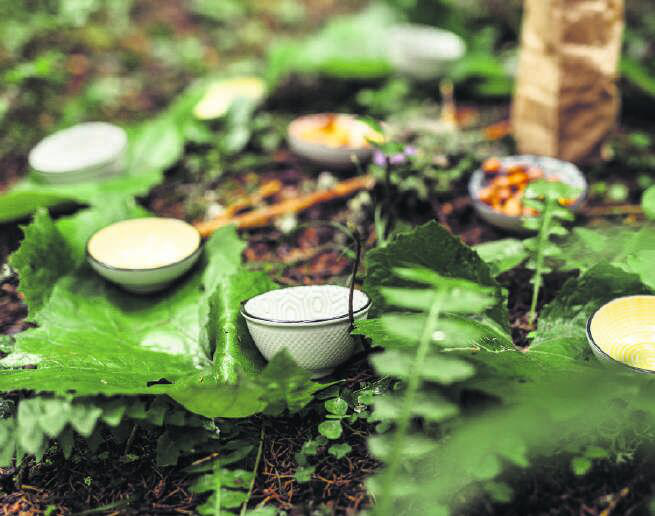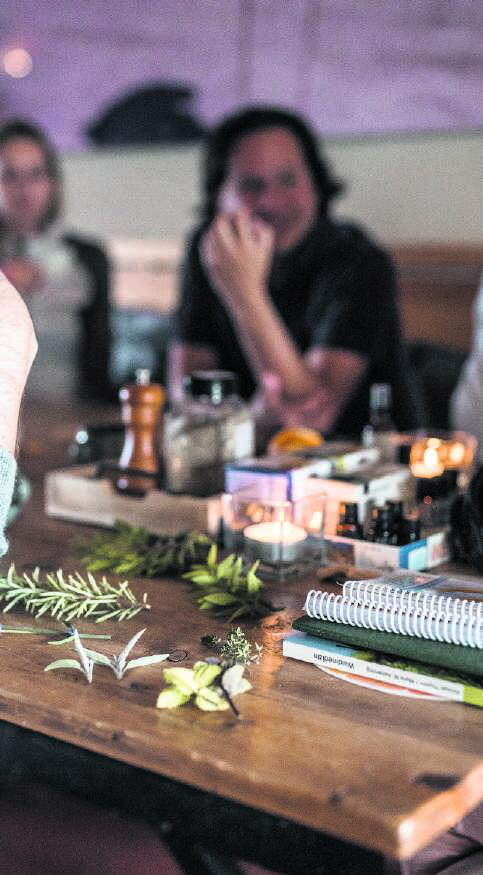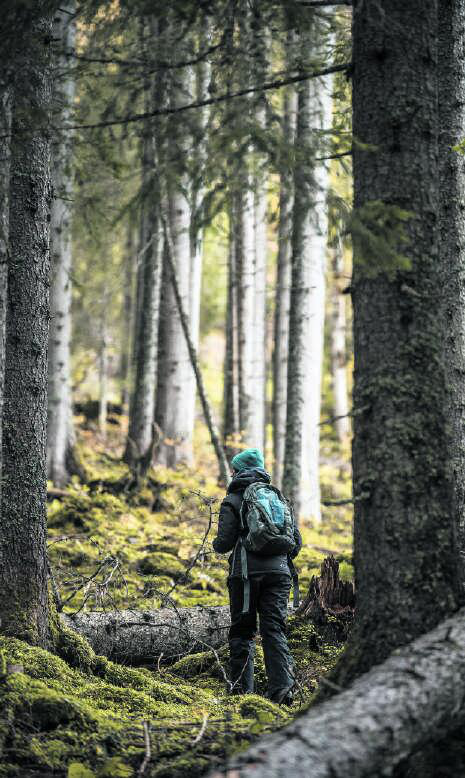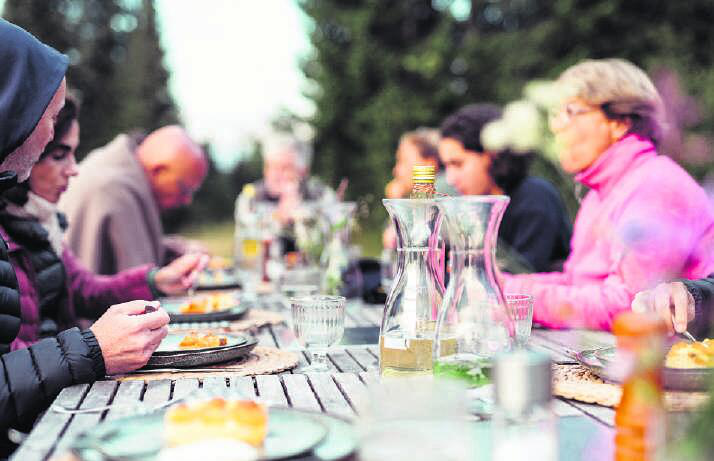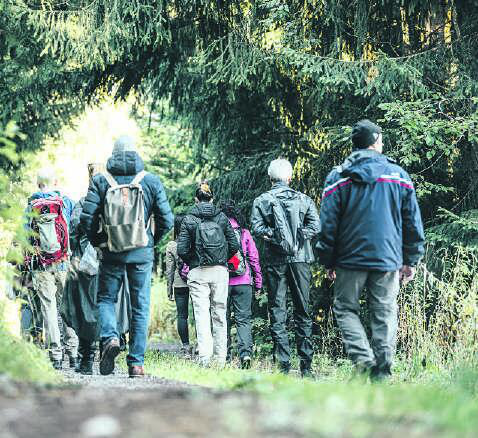Mindful nature
29.07.2021 ProfileMelanie Uhkötter is on a mission. As co-founder of the Friends of Saanenwald association, she is committed to enhancing the physical and mental health of people through a deep connection with nature. GstaadLife met with Melanie to learn how she helps people combat stress and improve their overall sense of well-being from a lodge nestled in the Saanenwald Forest above Saanenmöser.
I understand you have an international background. What is your connection to the Saanenland? When travelling with my family as a child I always enjoyed the vibe of hotels. When I left school I was tempted to study architecture, but instead decided to see more of the world by entering the hospitality industry. I completed a 2.5-year apprenticeship in Madeira before studying International Hospitality Management in the Netherlands. After that, I lived and worked in Ireland, Brazil, Portugal and again the Netherlands before moving to Switzerland, as Paul Peyer asked me to run what at the time was called the Hotel Saanewald Lodge.
How did the Friends of Saanenwald come about?
When we closed the Hotel Saanewald Lodge in 2016 there began a phase of reflection and planning. I had always been clear that I didn’t want to “do hotels” forever, although I was keen to use the experience I had gained in the hospitality industry. Right after the closure, there began a rather long phase of developing several concepts in order to find a sustainable solution for the lodge. None of them were promising enough, however.
Paul and I then simply asked ourselves what we would like to be involved within the long run, something that combined our mutual interest of nature, well-being and doing something for a good cause. After researching this we realised we could use the lodge’s spectacular location for retreat-like programmes constructed around these topics. It’s the perfect place for people to relax and de-stress from the modern world.
Why did you choose to be a non-profit association?
When we started developing the business plan for our idea, we realised the programme has to cover quite a number of costs – support and kitchen staff, guides, instructors, transport and so on. This meant that not everyone who wanted to experience our well-being programme would be able to afford it. Enabling wider participation was, I think, the initial thought to start the non-profit association. I had been employed by a non-profit hotel group in the Netherlands and saw how well that model can work.
This doesn’t mean that I am categorically against companies that focus on maximising profit, but that approach just didn’t feel right for us. We believe that access to programmes that improve your physical and mental health shouldn’t be a privilege and I’m proud that we are able to offer some sponsored stays, where participants in need pay only what they can afford. This increases our ability to help more people. Yes, being a non-profit feels right for us.
Whom do you primarily address with your retreats?
At the beginning we said “OK, we need to define our target market,” but we’ve been operating for almost three years now and still don’t have an answer to this question. It hasn’t mattered one bit. Logically we attract people suffering from stress, but arguably this is something most of us deal with at some time or another.
While the average age of our attendees is 38-48, we’ve hosted 70-year-olds and 22-year-olds. Our participants represent a wide range of lifestyles, from people who take care of the home to those who have the most demanding corporate jobs. I find it so enriching to see groups of strangers of such different ages and backgrounds sharing their experiences with each other. How often does that happen in everyday life?
Why did you choose to run your programmes in English?
We’re located near the so-called Röstigraben (the ‘Rösti trench’ cultural boundary between the German and French-speaking parts of Switzerland) so it makes total sense for us to use a third language. I realise we probably turn off some attendees because we operate in English, but we also bring together others who would otherwise perhaps have never met.
I would also add that while we run the programmes in English, you will hear many different languages at the lodge because we have such a mix of attendees.
One of your core philosophies is to connect people with nature through Shinrin-Yoku? What is that?
Shinrin-Yoku is the practice of mindfulness in a forest or natural environment. It slows down your mind and body, activates your senses and helps you to reconnect with nature, your body, and your emotions. It is a form of self-care for stress management and prevention developed in Japan in the 1980s by the Ministry of Health and Ministry of Agriculture and Forests. Designed as a way to counteract an increase in stress-related diseases and the associated cost on society, today Shinrin-Yoku is embedded in Japan’s health system and doctors can prescribe it as a course of treatment.
By the early 2000s Shinrin-Yoku slowly made its way to Europe with the first studies in place, and one could see a clear boom in the past five years. But one of the challenges is the lack of internationally-agreed quality standards. We aim to ensure the highest level of expertise and care to our attendees so partner with an instructor who runs an academy to train Shinrin-Yoku practitioners with a university professor in the field of environmental psychology as co-lecturer.
How does Shinrin-Yoku differ from a ‘normal’ walk in the forest?
When you go for a walk there’s usually a destination in mind, but with Shinrin-Yoku there is no plan to get from A to B – but to Be! Progress is also incredibly slow; on average we cover just 500 metres an hour.
This is because the main aim of Shinrin-Yoku is to activate your senses and bring you back to the here and now. I know many people love to let their mind wander when out on a normal walk or hike – I certainly do – but that’s not what we want in Shinrin-Yoku. Instead we notice how the mind is behaving, then use relaxation to re-focus it on the present. We achieve this through breath work, meditation, land art or embodiment practices like Qigong, which involves the repetition of precise sets of movements. Rituals also play a role. These will differ between practitioners but we, for instance, perform a ritual on entering the forest and usually end with a tea ceremony.
You have a partnership with the University of Bern. How does that work?
Our relationship with the University of Bern grew from the pilot programme we ran in 2019. We invited a number of people from the health care system to join us as well as the director of the Institute of Social and Preventive Medicine (ISPM) in Bern, who was initially sceptical but ended up loving what we offer.
We started this partnership for a couple of reasons: we have always been personally interested in research and we also want to contribute to Shinrin-Yoku’s credibility, especially to provide a science-based answer to people who claim that all we do is go into the forest and hug trees!
For now the university is running a small project to show the potential positive impact of an intensive one-week retreat in a Swiss forest environment with additional guided mindfulness practices on the mental well-being of Saanenwald attendees. The project will provide a starting point for future research about the positive effects of mindfulness practices and natural environments in a European context.
I also envisage us running more detailed and extensive research projects in the future.
What effect has Covid had on your retreats?
Core to our philosophy is community – sitting together, sharing meals and experiences – so I was pleased we had completed our 2020 season before the Covid restrictions became more stringent last autumn. That said, I think Covid has made people appreciate what we offer even more, especially single people who work from home. After months of lockdown, it was very special for them to be able to sit and converse with other people in a safe environment without any stress, pressure or rushing around.
On a practical level we are lucky to have huge communal areas and can guarantee social distancing. And while we try not to make Covid a huge topic, if any of our guests are especially concerned, we make an extra effort to ensure they feel comfortable.
What are your goals for 2021 and beyond?
Our plans for 2021 are already in place. We have retreats scheduled to run from June to October and we’re even going to host our first alumni weeks this summer, which is very exciting.
As for future goals, of course we would like to grow, but that growth could take various forms. It could be that we establish other locations or that we offer a broader range of programmes, perhaps a week involving more physical activity or a programme focused on cooking and nutrition. I’d also be interested in possibly hosting conferences on health and nature.
We see lots of opportunity. It’s amazing how many ideas flow over a glass of wine seated around the fire.
Finally, what is your own favourite spot in the region?
I like untouched places – probably like many other people. But it takes time, patience and dedication to explore and find them and I love doing this with curiosity but sorry, I will not share my favourite spot [she smiles].
But if I did have to recommend a place which is not a secret but in my opinion one of the highlights of the region, I’d recommend the hike from the lake of Lauenen, Geltenschuss, through a passage behind a waterfall to the Geltenhütte and for those who are keen, to continue even further up to the Wildhornhütte.
ANNA CHARLES




